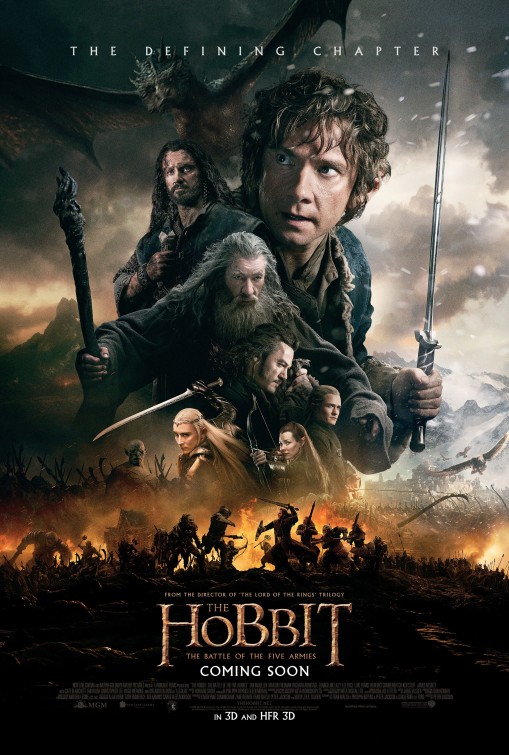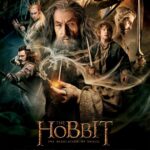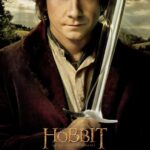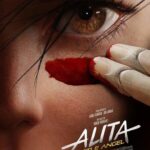Witness The Defining Chapter
Director
Peter Jackson
Starring
Martin Freeman
Richard Armitage
Ian McKellen
Re-reading my review for An Unexpected Journey, my hopes were high as I was immensely surprised by how much I enjoyed the first instalment of a Hobbit adaptation. This quickly dissipated as we reach The Desolation Of Smaug and the niggles and frustrations from the first film were magnified while all the positive elements shrank into a background of frankly questionable CGI. Which leads us here, to The Battle Of The Five Armies and like many of the main characters, I’m drained, defeated and mourning somewhat. What little hope that was planted by the first film has been quickly smothered and failed to blossom. All I’m left with now is a sense of disappointment.
The story once again picks up the second the previous film closed. Smaug circles Laketown and reigns down fire and death on the small populace. Then Bard kills him. No spoiler there, it’s dealt with so very, very quickly (as it is in the book, to be fair). With Erebor secured, Thorin [Armitage] and his company search the vast halls of gold for the arkenstone, the king’s jewel. Roaming the corridors, Thorin slowly grows mad with greed and mistrust. All the while, Bilbo [Freeman] is in possession of the jewel Thorin desires. Outside of the mountain’s keep, Bard [Luke Evans] is hailed as a hero and those that survived the attack look to him for leadership and guidance. He takes his people to the ruins of Dale and they do their best to thrive on what little they can forage. Thankfully Thranduil [Lee Pace] arrives with supplies and an army set on storming the mountain and reclaiming personal effects. As this army masses outside the mountain walls, Thorin sends word to his cousin for re-enforcements and two arms of an orc/goblin army are marching their way to one of the key strategic positions of Middle Earth.
One of the overriding strengths of this series was the quality of acting talent assembled. Aside from the call-backs, everyone who was given a role to perform did so with passion and vigour. Up until a point. While I praised the inclusion of the elf Tauriel [Evangeline Lilly], her relationship with Kili [Aidan Turner] fizzled and faded to a lot of staring and single-tear moments. With so much already going on, the conclusion to this relationship felt more bloated and clichéd than ever. Luke Evans returned to the role of Bard and ensured that despite the several similarities, it wasn’t simply a discount Aragorn and instead felt like a decent and rounded character – even if his stature and prowess seemed to stand out amongst his fellow Laketowners. Once again, Armitage and Freeman carry so much of these films on their sizeable shoulders, ranging their respective deliveries with precision and skill. But in this final outing, the real weight of their character development is glossed over all too quickly; all that malice and addiction Bilbo was combatting in the second film is all but gone. The ring is dismissed and any parallel between his coveting of the ring and Thorin’s dragon sickness is just glazed over and conquered with relative ease. Incidentally, I have some questions (no doubt answered in an extended DVD/blu-ray release but I don’t have time for that), firstly did Thranduil get his gems back? Where did those armoured goats come from? Were the orcs not able to command the Dune worms to involve themselves in the battle, or why not just burrow up through the mountain for that matter? Why did Bilbo start chucking rocks in the final battle, rather than using his short-sword? When Bard is using his son as a sight for his cobbled-together longbow, why did the force of the string not whip the boy in the face? What exactly is up with Galadriel’s powers? That woman makes no sense to me. But the biggest question I have is one which I’ve asked since the first film: rather than introducing characters who were not present in the book, would it be too much to ask to develop the dwarves? I mean, they’re only the central characters in the source material and as the film wound down, I looked across their faces and thought, “Who the hell are you? Have you been here the whole time?” I had hoped that we would spend more time with these largely unknown heroes with each passing film and the only thing I can tell you is that one of them looks like a badger, one of them is a simple young guy, one of them is a big fat ginger and the other.. er.. three? Four? They’re just extra dwarves. After spending nearly eight hours with these characters, you’d think I’d at least be able to identify who’s who. Their side-lining will forever be the bane of these movies.
But as good as the acting is, the Hobbit films have really been about the technical aspects and with a focus on 3D, advanced spinning panoramic shots of CGI backdrops and a higher frame-rate, much of the majesty of location has been lost. Gone are the iconic shots that defined The Lord Of The Rings with rolling mountains, hills and actual locations enhanced by spectacular set building and simple computer generated effects. In other words, despite being a defining quality, New Zealand feels largely missing from these movies. And it’s not just the backdrops that suffer, the mounting adversaries and advancing forces feel diminished. For example, Orcs are just the worst fodder. Despite marching in formation and obeying orders, they’re the easiest enemies to confound and defeat, felled by skilled warriors and novice children alike. Yet we’re supposed to believe that due to their number, they are a reckonable force. Even key supporting characters aren’t safe. Before the eponymous battle begins, the Ironfoot dwarves appear, led by Thorin’s cousin, portrayed by Billy Connolly. Now, I have no actual knowledge of this, so the following is just speculation based on the final result but excluding his eyes, I’m quietly convinced that Connolly’s entire performance was motion capture rather than make-up; which is such a baffling decision. Yet all of this could be partly forgivable if the score really rallied the audience and drew them in for one last charge. Unfortunately, the only identifiable moments of Howard Shore’s score were the Lord Of The Rings themes. I know the solemnity of the Misty Mountain theme from An Unexpected Journey may not have fit once they claimed Erebor but would that not be the running theme of the characters and their plight? I find it flat-out stupid that the strongest element of this new score was absent from this final instalment.
Having previously complimented Jackson on his decision to leave the meat of the dragon attack until this film, I’m bitterly disappointed that the encounter was done and dusted before the opening title card. Narratively speaking it would make sense: how long would a wooden town last against a dragon, especially when they only have one black arrow to stop it? But to have the confrontation end so quickly was just a bit of a shock. And what was with all those Laketown survivors whinging about not having any food? There’s a huge fucking dragon in the lake, just cut him up and feast for a bloody lifetime! I am willing to forego a movie’s stumbling if it is saved by a later instalment. Case in point, Casino Royale was amazing, Qauntum Of Solace was ok but rather flat, then Skyfall managed to set an interesting tone that not only provided a decent film but elevated Quantum Of Solace to ‘necessary character development’ rather than ‘botched sequel.’ I was desperately hoping for the same thing here. To my mind, The Hobbit opened well and then started to lose its way a bit but if the third instalment answered the necessary questions and delivered the finale we were all expecting and hoping for, everything would work. You could watch all three back-to-back in a marathon and they’d work beautifully. Only it doesn’t. And as the film closes in pretty much the same way Revenge Of The Sith did, you can’t help but sigh and mutter, “Not again.” One praiseworthy element (that other prequels have never been able to do) is the nature of legacy. If you introduce a child to Star Wars using the prequels first and then the sequels, all the call-backs don’t make any sense and the twists of the original films are all but ruined. If, on the other hand, you were to show a child The Hobbit films first and then Lord Of The Rings, there are very few reveals that are haphazardly spoiled. Legolas goes off to find Strider, whose real name is not revealed; Saruman’s treachery is never properly shown; Bilbo’s magic ring is never explicitly identified as the one ring; I was half-expecting Balin to wave goodbye to Bilbo and then find a map and say to himself, “Hmm.. the Mines of Moria, eh? Maybe I’ll go take a look at them..” but he didn’t. Not even referenced. It’s just a nice touch of restraint.
So at the end of things, how has The Hobbit fared? Averagely, I think is the honest answer. It’s a pretty commendable prequel trilogy but one which felt like too much was injected and the conclusions of these new elements were simply unsatisfactory. Portraying a relatively small children’s tale as a three part blockbuster epic was always an ambitious challenge and Lord Of The Rings comparisons were always going to be drawn but whether or not Jackson failed or succeeded, I think we can all agree that in lesser hands, the final outcome could have been much worse. A small modicum of positivity and possibly heavily optimistic but true nonetheless.
Release Date:
12th December 2014
The Scene To Look Out For:
Tolkien has always spoken fondly of Hobbits and held them in high regard. At almost any opportunity in his books, Hobbits are the honest folk who just go about their business and keep themselves to themselves. I know this is some sort of allegory for rural folk at the turn of the twentieth century but I fucking hate Hobbits, they’re bloody awful. As a man who grew up in a city and moved to a rural setting, I find Hobbits to be backward, racist, ignorant, lazy, selfish and stubborn. Say what you will of the other fictional races, at least their defining traits aren’t limited to getting drunk, high, eating or sleeping. Nowhere is this more cemented than Bilbo’s return from his quest. Tired and emotionally exhausted, he arrives in the Shire to find his home ransacked and his items being auctioned off. Furthermore, he is required to prove his identity in order to retain his own possessions. It’s a fucking harrowing image and highlights Hobbits as the true detestable villains of Middle Earth. Piss on Hobbits. And before you start blathering on about Frodo saving the world, he didn’t. He put the ring on and tried to escape, it was only because Gollum jumped on him that the ring was destroyed. Bugger the lot of them.
Notable Characters:
Rather than choosing a positive standout performance, I’m going to prey upon a negative one. I don’t have anything against Orlando Bloom, the guy has his roles and has proven himself in several releases but returning to the role of Legolas always felt odd. Not because of his inclusion but because of the performance. I can accept that his face has aged ten years, I don’t care about that, what annoys me is his manner. The Lord Of The Rings was a breakout role for Bloom and with everything new and wondrous to him, it came across in his portrayal of the elf. Here, he’s older, more arrogant, aggressive, poised and composed. The reason it annoys me is it doesn’t work with the continuity. If it were another actor, you could forgive and even understand their interpretation but as the same individual has returned to the role but can no longer channel that same pitch.. I dunno.. it feels like attending a reunion concert and the lead singer’s voice is just warped and alien.
Highlighted Quote:
“If you don’t mind, I have a wee proposition. Would you all mind just sodding off?”
In A Few Words:
“A rather sullen close to a potentially promising series. Acceptable but Jackson is capable of so much more”
Total Score: 1/5

![The Red Right Hand Movie Reviews [Matthew Stogdon]](https://reviews.theredrighthand.co.uk/wp-content/uploads/2021/12/cropped-header1.png)



